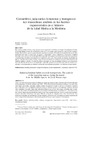Please use this identifier to cite or link to this item:
https://accedacris.ulpgc.es/jspui/handle/10553/58727
| Title: | Costumbres judaizantes femeninas y transgresiones masculinas: análisis de las fuentes inquisitoriales en el tránsito de la Edad Media a la Moderna | Other Titles: | Judaizing feminine habits ana male transgresions: The analysis of the Inquistion sources during the transit from the Middle Ages to the Early Modern Age | Authors: | Zozaya Montes, Leonor | UNESCO Clasification: | 55 Historia | Keywords: | Identidad Judaizantes Transgresión religiosa Fuentes inquisitoriales Guadalajara, et al |
Issue Date: | 2011 | Journal: | Investigaciones Feministas | Abstract: | Este artículo analiza treinta y cinco procesos de fe enjuiciados en Molina de Aragón (Guadalajara) a finales de la Edad Media e inicios de la Moderna (1492-1553). En primer lugar, estudia los procesos de fe inquisitoriales finiseculares, que en su gran mayoría enjuiciaron a mujeres. Se centra en el papel de ellas en los ritos judaizantes del lugar, ya fuese sola, en grupos, o induciendo a otras compañeras a practicarlos. También investiga varios procesos de fe del siglo XVI, todos ellos de hombres. La comparación entre las acusaciones y declaraciones de ambos sexos muestra dos tendencias en la zona. Por un lado, las mujeres practicaban las típicas costumbres judaizantes (incluso auque fuesen más propias de ámbitos masculinos). Por otro lado, los hombres tendían a agredir a la religión católica imperante, así que en términos religiosos sus infracciones eran más difíciles de clasificar. Acompañando a todo ello, plantea diversas relecturas sobre las fuentes conservadas y la información que brindan, en relación con cuestiones de género, y la información que omiten. Thirty five faith proceedings of law in Molina de Aragón are analyzed, dated from the end of the Middle Ages to the beginning of the Early Modern Age (1492 - 1553). First, the inquisitorial proceedings of the end of the 15th century are studied, regarding, mainly, women. An analysis is made of the role of women in judaizing rites of the place, be it in regard to isolated women, to feminine groups or for inducing women to proceed with judaization. Secondly, some other faith proceedings of law, of the 16th century, regarding men exclusively, are also studied. Comparison between accusations and declarations according to sex show that in that area women practiced typical judaizing habits (even if they should correspond more to a man's environment), whereas masculine infractions were more difficult to classify in religious terms, they tended to be very aggressive regarding the dominating Catholic Religion. Different types of readings are made regarding the sources kept and its information, related with gender differences and omission of information. |
URI: | https://accedacris.ulpgc.es/handle/10553/58727 | ISSN: | 2171-6080 | Source: | Investigaciones feministas: papeles de estudios de mujeres, feministas y de género [ISSN 2171-6080] (2), p. 355-377 | URL: | http://dialnet.unirioja.es/servlet/articulo?codigo=4132272 |
| Appears in Collections: | Artículos |
Page view(s) 5
366
checked on Jan 15, 2026
Download(s)
262
checked on Jan 15, 2026
Google ScholarTM
Check
Share
Export metadata
Items in accedaCRIS are protected by copyright, with all rights reserved, unless otherwise indicated.
